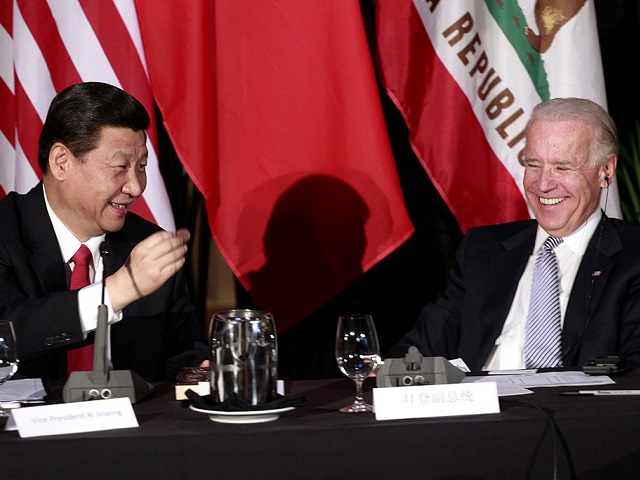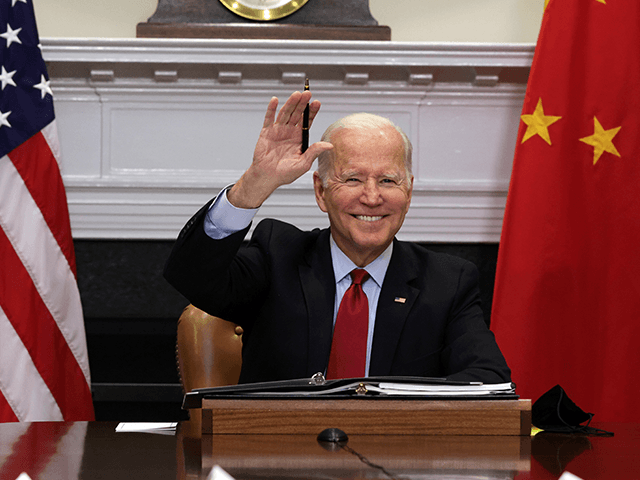The Office of the Director of National Intelligence (ODNI) released a declassified security assessment on Tuesday that said China demonstrated a “greater willingness” to interfere in the 2022 midterm elections, because Beijing saw benefits to such interference, and did not fear the Biden administration’s response.
ODNI said China was significantly more aggressive about interfering in U.S. elections than it was during the 2020 presidential election when it “considered, but did not deploy, influence efforts intended to change the outcome.”
The report said China was worried about getting caught in 2020, but not so much in 2022, when Chinese officials “believed that Beijing was under less scrutiny” and “did not expect the current Administration to retaliate as severely as they feared in 2020.”
China’s interference efforts in 2022 looked like a strategy to portray American democracy as “chaotic, ineffective, and unrepresentative” by exploiting divisive issues like abortion and gun control.

Old pals: Chinese Vice President Xi Jinping (L) shows U.S. Vice President Joe Biden a chocolate-covered macadamia nut in 2012. (Jay L. Clendenin-Pool/Getty Images)
The report said China “tacitly approved efforts to try to influence a handful of midterm races involving members of both U.S. political parties,” but did not specify which ones, at least not in the unclassified version released to the public.
The Chinese generally sought to “counter U.S. politicians viewed as anti-China” and “support others viewed as pro-China,” but apparently did not believe they could arrange a major shift in the U.S. government’s stance toward Beijing, so their strategy was more focused on trashing democracy in general.
“PRC [People’s Republic of China] leaders most likely see their growing efforts to magnify U.S. societal divisions as a response to what they believe is an intensified U.S. effort to promote democracy at China’s expense,” the report said.
ODNI redacted most details about exactly what the Chinese did, although the public version of the report did mention “covertly denigrating a named U.S. Senator online using inauthentic accounts” as an example of mischief.
The report also suggested some “divisive content” on the Internet, such as “a video that cast doubt on the utility of voting” and “commentary that questioned the legitimacy of the 2020 presidential election,” might have been produced by Chinese agents, although the authors did not have a high level of confidence in these allegations.
Unsurprisingly, a great deal of the propaganda attributed to China flowed through TikTok, where known PRC influence accounts garnered “tens of millions of views in the United States.”
ODNI said China, and other foreign actors, apparently took a break from attempting to hack election systems in 2022.
“The decentralized, heterogeneous U.S. election system poses challenges to foreign actors attempting to interfere with many elements of the election infrastructure,” the report said.

File/ U.S. President Joe Biden waves as he participates in a virtual meeting with Chinese President Xi Jinping at the Roosevelt Room of the White House November 15, 2021 in Washington, DC. (Alex Wong/Getty Images)
ODNI said most foreign actors are more interested in “amplifying authentic U.S. public narratives to try to influence electoral outcomes, increase mistrust in U.S. election processes, and stoke sociopolitical divisions.”
The report noted Russia and Iran were among the other foreign actors who made significant efforts to influence the 2022 midterm elections. Russia largely sought to “denigrate the Democratic Party” and “undermine U.S. support for Ukraine,” while Iran pursued its “longstanding goal of weakening U.S. support for Israel.”
Iran’s influence networks “generally supported left-leaning U.S. politicians” and “espoused pro-Palestinian sentiments at the same time they expressed positive sentiments toward progressive candidates.” Americans would soon enough be shocked to discover how deep the connections between progressive politics and Palestinian terrorism ran.
ODNI said Iran devoted comparatively modest resources to election interference efforts in the United States because it also tried to influence elections in Albania, Bahrain, and Israel. The Israeli elections, held one week before the U.S. midterms, were a “priority for Tehran.”
The report said Iran generally has less money to spend on election interference than China or Russia, and does not seem to regard increased spending on such efforts as a good investment.

COMMENTS
Please let us know if you're having issues with commenting.